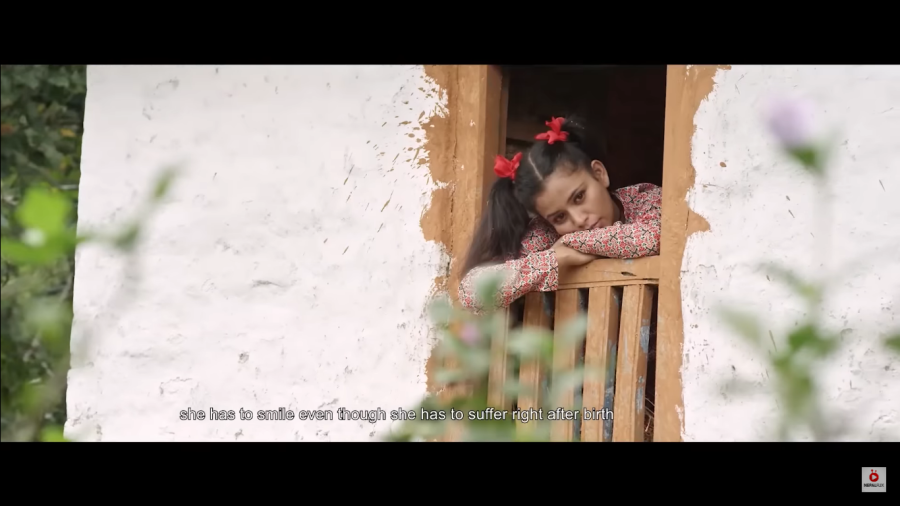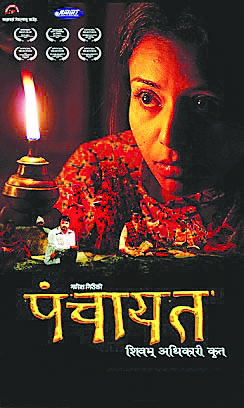Movies
A tale of regret and remorse
Shivam Adhikari’s ‘Panchayat’ boldly confronts taboo subjects and their consequences within the context of rural Nepal.
Anish Ghimire
With the picturesque landscape of a rustic village in western Nepal in 1975 as the setting, director Shivam Adhikari crafts a powerful and thought-provoking narrative in ‘Panchayat’. The film delves deep into the intricacies of tradition, morality, and the human condition.
Central to this tale is Thuloba, portrayed masterfully by Saroj Khanal, the revered head of the village, known for his wisdom and humility. He wields authority over the villagers, and they abide by his every word. The story unfolds when Thuloba’s son impregnates a woman before marriage, inciting the entire village to turn against her. The villagers hurl stones and attempt to cast her out, as shown at the beginning of the movie. However, it is Thuloba’s act of compassion in dignifying the woman and making her his daughter-in-law that forms the crux of the narrative. This act, while controversial, wins the hearts of the villagers and sets the stage for the exploration of moral dilemmas and redemption.
Parallel to this, we meet Kopila (portrayed by Neeta Dhungana), who stands in stark contrast to Thuloba. She is a young girl on the cusp of womanhood, slowly awakening to her own sexuality. Her curiosity about intimacy is piqued by conversations with her married friend, which eventually leads her to explore her own body. The contrast between her innocence and her burgeoning curiosity is beautifully portrayed. However, her journey takes an unexpected turn when she experiences her first menstruation. Kopila is made to stay in a goat’s shed for 22 days, enduring loneliness and emotional distress, effectively portraying the challenges faced by young girls during this traditional isolation. The director has unflinchingly shown the emotions carried by Kopila, which are loneliness, fear, and emotional desolation.
The narrative reaches a turning point when Kopila bathes in a nearby pond. As she undresses, feelings of arousal overwhelm her. Thuloba, who coincidentally arrives at the same pond, is drawn into an intimate encounter with Kopila. The aftermath is a haunting portrayal of guilt and remorse, with both characters suffering deeply. Thuloba’s physical and emotional deterioration is particularly moving, while Kopila’s silence speaks volumes about her inner torment.
The actors deliver outstanding performances, portraying the silent pain of their characters with subtlety. Details like the shaky hands of Thuloba when he meets Kopila in a puja and when he tries to touch her feet, she hides her legs away, convey the intensity of their emotions. We then see Thuloba in deep worry as his reputation is at risk.
The narrative takes a darker turn as Kopila finds herself pregnant and desperately seeks refuge in Thuloba. On the morning of Laxmi Puja, she runs towards Thuloba seeking some homage, but Thuloba shakes in fear and tries to hurl Kopila away by saying, “Go away,” Kopila clearly seeing no way out, asks, “But where should I go?” To that, he replies, “Go where you find peace,” As she runs away in desperation, Thuloama, the wife of Thuloba (played by Rupa Rana), who heard the entire conversation, provides advice for her husband. She becomes a voice of reason as she persuades her husband to marry Kopila in a bid to preserve the family’s honour.
The heaviness fading from Thuloba’s face is heartwarming as he thanks his wife for her sacrifice. But as he runs towards Kopila, he finds out that she did indeed take the path where she could have found peace. Surrounded by the villagers, Koipla is seen hanging by a tree near the pond, and her parents are wailing in great agony. Thuloba quietly looks at the casualties caused by his decisions and walks away, filled with guilt and remorse.
The movie is a harrowing exploration of tradition, morality, and the human spirit. It boldly confronts taboo subjects and their consequences within the context of rural Nepal. The film’s awards at the San Francisco Film Festival in 2018, including Best Foreign Language Feature and the Best Actress award for Neeta Dhungana, underscore its impact and significance.
The film’s use of sound and music is both evocative and effective, enhancing the emotional depth of the unfolding scenes. While there are occasional issues with dubbing, the overall impact remains powerful.
Dhungana’s performance as Kopila is excellent, capturing the remorse of a village girl convincingly. Similarly, Khanal’s transition from a respected leader to a troubled soul was portrayed with great skill.
Shivam Adhikari has put together his resources skillfully, and he is smart about which scenes should be long and which scenes should be short. But at times, the movie does feel a little slow-paced. An example of this is the opening scene where the villagers are chasing the girl—it seems to go on forever.
The film also immerses the audience in the rural village of western Nepal, using authentic language and historical accuracy to transport viewers to the mid-70s. The incorporation of actual footage from the era further adds to the film’s authenticity.
All in all, ‘Panchayat’ is a raw and heart-wrenching tale that leaves us pondering over the choices we make, the complexities of tradition, and the far-reaching consequences of our actions. It is a poignant reminder of the enduring power of storytelling to shed light on the human condition.
Panchayat

Director: Shivam Adhikari
Language: Nepali
Cast: Neeta Dhungana, Saroj Khanal, Rupa Rana, Jahanwi Basnet
Duration: 2 hours 18 minutes
Year: 2018
Available on: YouTube




 9.83°C Kathmandu
9.83°C Kathmandu












